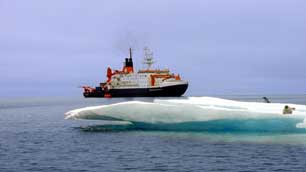Canadian PM Stephen Harper Defends Arctic Seismic Tests
 Prime Minister Stephen Harper has waded into the growing debate over a controversial Arctic seismic testing program in Lancaster Sound.
Prime Minister Stephen Harper has waded into the growing debate over a controversial Arctic seismic testing program in Lancaster Sound.
The debate over the program reached a new level on Sunday when the Nunavut Court of Justice issued an injunction temporarily halting Natural Resources Canada’s geomapping project in the sound, located at the eastern entrance to the Northwest Passage.
Inuit in five communities in the area — Resolute Bay, Arctic Bay, Grise Fiord, Clyde River and Pond Inlet — have largely opposed the project, arguing the sound blasts used to map the seabed would disrupt the migration patterns of whales, polar bears and other wildlife that they have relied on for generations.
Inuit and environmental groups have also raised concerns that geomapping could lead to oil and gas exploration in an area that Ottawa is thinking of designating as a national marine conservation area.
For scientific purposes only: Harper
“The work being done there is not for oil and gas exploration,” Harper told reporters in Vancouver.
“The work being done there is general scientific mapping work that the federal government has been sponsoring across the Arctic region to better scientifically understand the region and obviously create scientific opportunities.”
The project is a collaboration between the Geological Survey of Canada, which is part of Natural Resources Canada, and the Alfred Wegener Institute of Germany.
The German institute’s ship Polarstern has been sailing toward Lancaster Sound, off the north coast of Baffin Island, with permits to conduct seismic tests on the sea floor.
Potential for ‘irreparable harm’
The Qikiqtani Inuit Association, which represents Inuit in the five affected communities, sought the injunction, arguing that Inuit had not been meaningfully consulted about the project.
In her written decision, Judge Sue Cooper noted that a consultant’s report — which the federal and Nunavut governments cited to back their claims that seismic tests would have little or no impact of marine mammals — came with protocols to mitigate the impact of seismic activity on wildlife.
Those protocols support “the conclusion that there are impacts,” wrote Cooper, who concluded that “Inuit in the five affected communities will suffer irreparable harm if an injunction is not granted.”
Arctic Bay resident Moses Uyukuluk, who attended Natural Resources Canada’s consultation meeting in his community, said he’s thankful the Qikiqtani Inuit Association defended people’s rights in court.
Speaking in Inuktitut, Uyukuluk told CBC News the federal scientists’ proposal to have Inuit observers aboard the research ship would be “a useless thing, because the actual testing will be done deep in the water and people won’t be able to see what is down there and what is being affected.”
“Inuit are dependent on marine mammals for food, so it seems it was a useless gesture,” Uyukuluk said. “I don’t want them to proceed whatsoever.”
Authorities not commenting
Officials with the Nunavut government and the Nunavut Impact Review Board, both of which gave their approvals to the project, told CBC News they are reserving comment while they study Cooper’s decision.
Natural Resources Canada says it is committed to geomapping projects across the North. The department withheld further comment, saying the project is subject to continuing legal proceedings.
Lawyers for the Inuit association said the federal government has a number of options, from cancelling the project altogether to holding meaningful consultations with affected Inuit. They could also appeal Cooper’s injunction, the organization added.



